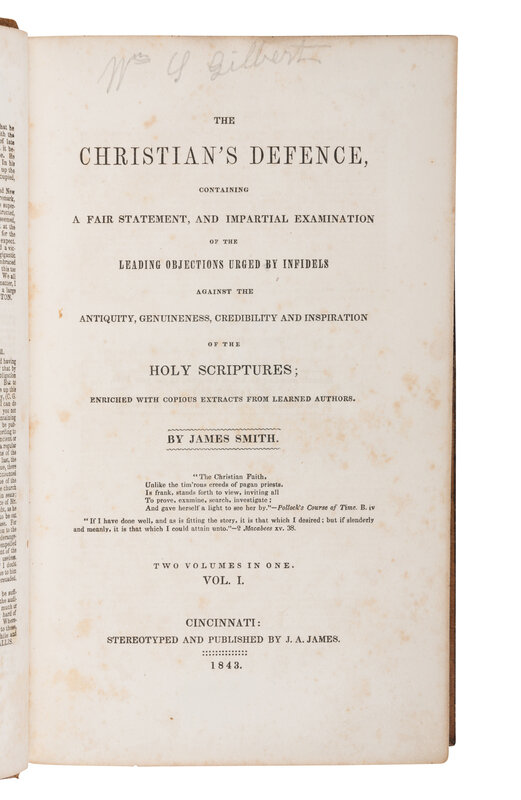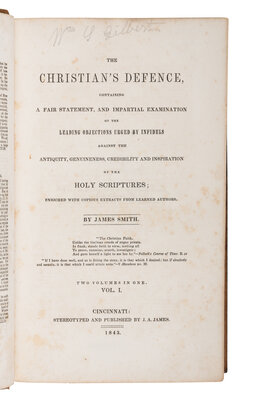Condition Report
Contact Information
Lot 315
[LINCOLN, Abraham]. SMITH, James. The Christian's Defence. Cinci, 1843. RARE FIRST EDITION.
Sale 2065 - Fine Printed Books and Manuscripts, Including Americana
Nov 14, 2024
9:00AM CT
Live / Chicago
Own a similar item?
Estimate
$400 -
600
Price Realized
$5,080
Sold prices are inclusive of Buyer’s Premium
Lot Description
[LINCOLN, Abraham (1809-1865)]. SMITH, James (1798-1871). The Christian's Defence, Containing a Fair Statement, and Impartial Examination of the Leading Objections Urged by Infidels Against the Antiquity, Genuineness, Credibility and Inspiration of the Holy Scriptures. Cincinnati: J.A. James, 1843.
2 volumes in one, 8vo (222 x 133 mm). 6 plates including 2 folding. (Some browning to plates, spotting throughout.) Contemporary speckled calf, black morocco lettering-piece gilt (few surface scuffs to lower cover, light rubbing to extremities). Provenance: William Y. Gilbert (penciled signature on title-page); H.E. Barker, Lincolniana, Los Angeles, California (TNS tipped-in); Otto L. Schmidt (1963-1935), collector (posthumous bookplate); presented to The Gilpin Library of the Chicago Historical Society (bookplate, notations on dedication leaf).
FIRST EDITION. James Smith was minister of the First Presbyterian Church in Springfield, Illinois from 1849 to 1856, where the Lincolns occasionally attended church. Lincoln first heard Smith preach at age 16 when he spoke at a revival in Rockford, Indiana. Recognizing the author as someone from home, Abraham Lincoln reportedly began reading The Christian's Defence when he came across it while traveling. Known for his skepticism about organized religion, Lincoln reportedly engaged deeply with Smith's book. Smith wrote The Christian's Defence as an apologetic work, arguing for the rationality and truth of Christianity in the face of skepticism and criticism. His blend of logical reasoning with a defense of Christian doctrine seemed to resonate with Lincoln's intellectual curiosity and his desire to reconcile reason with faith. As a result, Lincoln moved toward a more profound understanding and appreciation of Christian principles, even though he never fully aligned with a particular denomination. In William E. Barton's "The Soul of Abraham Lincoln" (p.164), the author quotes a passage in a letter from Lincoln to his brother-in-law, Ninian W. Edward, as having read "a work of Dr. Smith on the evidence of Christianity, and have heard him preach and converse on the subject, and am now convinced of the truth of Christian religion."
Smith's influence on Lincoln extended beyond the realm of personal belief to his public and political life. Some historians suggest that Lincoln's later speeches, such as the Second Inaugural Address, reflect a deeper theological introspection that may have been shaped by the arguments and perspectives found in Smith's work. RARE: We trace only one other copy of the present work at auction in the last century (sold Swann Galleries, January 1975).

